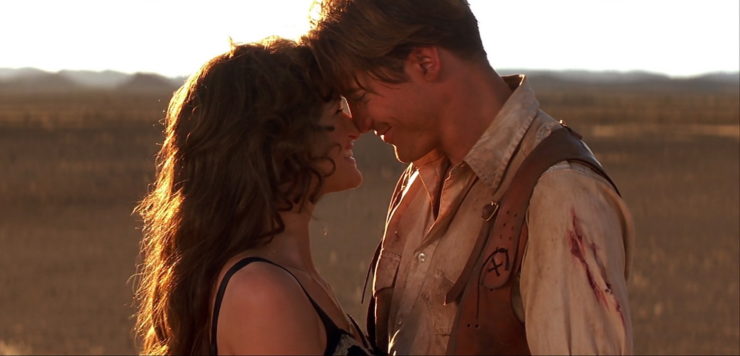It’s a truth universally acknowledged that The Mummy (1999) kicks ass. The last few years have seen an upswell of appreciation for the movie’s lighthearted tone, wacky humor, and the fizzy performances from Brendan Fraser and Rachel Weisz—but seeing all the tweets and online conversations made me wonder if there’s something more to The Mummy. Some secret truth buried beneath the sand, waiting to be found.
I believe there is, and if the reason for the love raining down like so many startled frogs is hard to quantify. People enjoy the surprisingly quirky romance, as well as the ways Rick O’Connell and Evelyn Carnahan sidestep the usual tropes of “action hero” and “damsel in distress”. But more even than that, my research (i.e. spending far too much time online) is showing me that a lot of kids watched The Mummy just as they were hitting puberty, and a lot of those kids, er, realized things about themselves, specifically because of that film.
Join me as I attempt to unpack those realizations.
The Mummy is a rare movie that is actually great for almost all ages. It’s a perfect movie for sleepovers, for Sunday afternoons, for repeated afterschool viewing—just horror enough to make a kid feel brave, but fun enough that it won’t do the kind of psychological damage that your The Rings or your Saws will. There’s no onscreen sex, so most parents won’t notice just how erotically-charged it is. The time period is remote, but between World Wars, so there isn’t as much real-life horror hanging in the background as there is in, say, Indy’s outings. Rick, Evie, Jonathan, and Ardeth Bay are charming and quirky and it’s easy to see yourself in them, whether you’re a jock, a nerd, a fuckup, or impossibly hot, and since each of them gets a chance to be a hero, there’s no shame in identifying with any of them. This is an especially important point because any kid can watch it and feel safe, or even taken care of, by the movie.
But the biggest reason this movie has remained so popular is that it made a point of showing you what a typical movie would do, and then doing the opposite. Along the way, it subverted tropes and gender roles at every opportunity in a way that a lot of people like me, who spend too much time on the internet, sum up with the phrase “chaotic bi energy.”
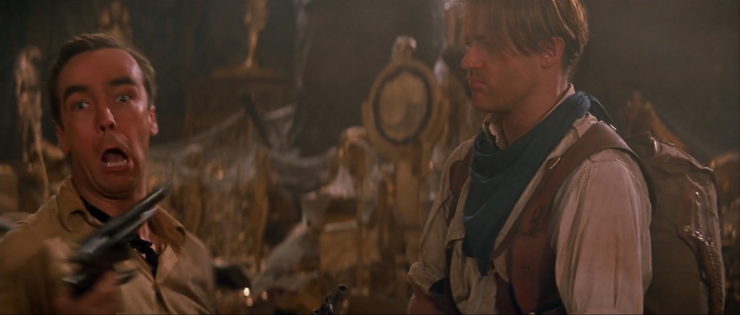
The Mummy was initially promoted as a flashy remake of the 1930s Universal horror classic, as is made clear by the first trailer, but even by the second trailer the filmmakers were highlighting moments of Indiana Jones-style action. The biggest moments in all the ads were images of the titular Mummy’s face appearing in sandstorms, and, especially given that the movie was released the same summer as The Phantom Menace, it was easy to assume that this was a silly, late-90’s equivalent of a B-movie. But that is not quite the movie we got.
This becomes especially interesting when you look at the threads of influences The Mummy was supposed to be building on, namely adventure serials, Foreign Legion movies, and Mummymania, all of which were popular in the first half of the 20th Century:
- Serials stuck tight to genre—you went into a serial knowing what a “jungle” picture would give you, versus a “western” or a “spy”. They also, usually, kept their characters within rigid gender roles, so while you got the occasional plucky girl reporter or lady scientist, the hero was usually a rugged, square-jawed man. The serials planted the seeds for, among others: Indiana Jones, Tales of the Gold Monkey, Scrooge McDuck/Ducktales (a Scottish-American adventurer, fluent in a ludicrous number of languages, who encounters historical figures improbably often, and is once chased by a giant boulder? Hm.), all the later adaptations of H. Rider Haggard’s oeuvre, and The Rocketeer—all before The Mummy picked up the thread.
- The French Foreign Legion gave us a a small cul du sac of books and movies between the end of the 1800s and WWII, most of them focusing on stories of honor and sacrifice. Since the real Legion took people of any nationality without asking as many questions as most national armies, “running away to join the Foreign Legion” could be an easy shorthand to explain that a character came from a humble background, or needed to find redemption after a shady past. Plus, since the Legion’s training regimen was notoriously brutal, it was also a simple way to let the audience know that your main character’s a badass. Many of the stories hinged on dishonorable Legionnaires who betrayed their fellows, and many of them featured a lady love who waited faithfully for the hero’s return from battle.
- Finally, the idea of cursed mummies was huge in (white, western) literature for decades before the excavation of Tutankhamun’s tomb set off a new burst of interest in ancient Egypt-based horror. Universal gave us The Mummy in 1932, and focused on Boris Karloff’s performance as a doomed romantic. The focus of his love, Helen Grosvenor, spends much of the film entranced, helpless, and wearing pre-Code lingerie, and only lives when she prays to Isis for help.
Given that lineage, The Mummy could have just checked off a couple tropes from each column, made its female lead “feisty”, CGI-ed the crap out of its villain, and turned in the passable adventure/horror mashup the trailers promised. Instead, it brings us up to the edge of our expectation before swerving in a new and unexpected direction each time.
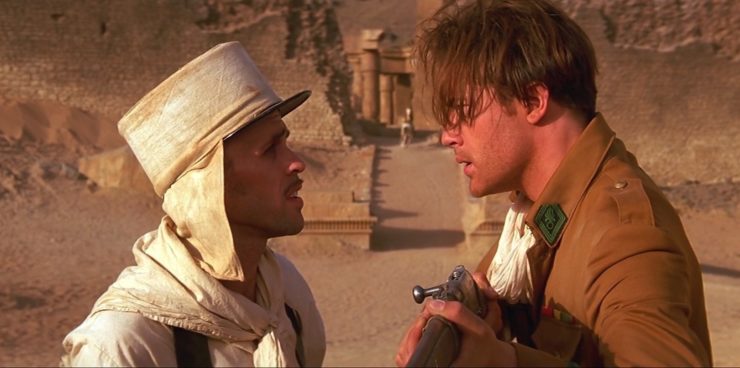
When we meet Rick, he’s is in the Foreign Legion, on the front line of a battle. His captain deserts, leaving him as a sudden commanding officer. Then his friend Beni bolts (The IDEA of betraying America’s Sweetheart Brendan Fraser!) and Rick is left hollering “Steady!” at the men who are suddenly his. The film has given us the bullet points of a Foreign Legion movie in under two minutes. But here the movie veers away from expectation: Rick doesn’t survive because of any skill or bravery (though he has both)—instead he survives because suddenly he’s in a 1930s horror movie, and the other army is afraid of the Curse of Hamunaptra. And he doesn’t go down fighting—when he’s cornered he screws his face up and waits to be shot, which, when the shots don’t come, he slowly opens one eye to see what the hold-up is. And this is how the movie shows us that Rick isn’t a typical stoic Legionnaire: he’s Bugs Bunny.
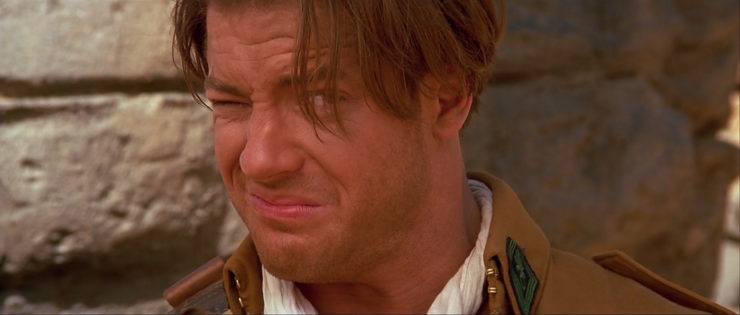
It would have been easy to make Rick O’Connell a gruff, honor-bound hero of previous Foreign Legion movies, or a bland walking-cardboard-cutout hero as an homage to ’30s horror. He also could have been a lovable lunk—the type Fraser had played in everything from Encino Man to George of the Jungle. Instead, Rick is sharp as hell, and he expresses his intelligence in two interesting ways. First, with a deadpan sense of humor that has clearly been honed by a life of danger.
Buy the Book
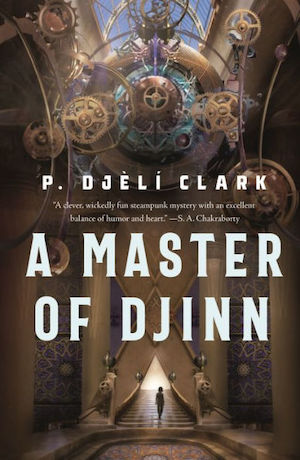

A Master of Djinn
But the more interesting way is that he always, but always, defers to Evie in the field. He crosses a line a couple times, kissing her while he’s a prisoner so that he can beg for his life, and chucking her into a bedroom to protect her from Imhotep. But other than those times, and especially if they’re at the dig site, he treats her with utter respect. He recognizes her expertise, never questions her, steals tools for her, and listens with genuine interest when she tells him about her work. He is also respectful to the beliefs and traditions around him, even when he doesn’t fully believe in them himself. He listens to Ardeth Bay. He even accepts Jonathan for exactly who he is, never expecting him to be more stereotypically macho. He shows his intelligence by knowing when to check his own ego, step back, and let the experts do their thing—how often does that happen, in movies, or in life?
Evie, meanwhile, could have just been your average repressed librarian cliche. But no, when we meet her she’s talking to the library books as she shelves them. That instantaneously tells you most of what you need to know about Evie. The easiest way to talk about Evie might be to just look at The Mummy’s biggest influence: the Indiana Jones series. As my esteemed colleague Emmet pointed out, Evie might be even better than Marion?
At the beginning of Raiders of the Lost Ark, Marion is a perfect character with a perfect introduction. She’s a barkeep in a drinking contest with a lorge man, which she wins. When a Nazi menaces her, she keeps her cool right up until the moment it looks like he’s going to burn her eyes out of her head, but then she manages to escape and keep her wits about her enough to reclaim the amulet she needs. She declares herself Indy’s “goddamn partner!” at one point, and seems just as tough as him. But as the film continues she becomes increasingly passive, kidnapped by Belloc and failing in her attempt to escape him. There is also the constant, haunting fact that she had a relationship with Indy when she was a teen, he left her, and she’s obviously not over it, which knocks their relationship askew the entire time. The last time we see her she’s in a dress and heels consoling Indy for losing possession of the Ark. (Meanwhile Willie spends her time in Temple of Doom screaming and chasing jewels and/or a rich husband. Ilsa and Irina Spalko are both scholars, but they’re also a Nazi spy and a Red spy, respectively, because apparently knowledge can only be your treasure if you’re a man or an alien?) When we next meet Marion she’s had a full life and career—but both of those things have been shaped and compromised by raising Indy’s son.
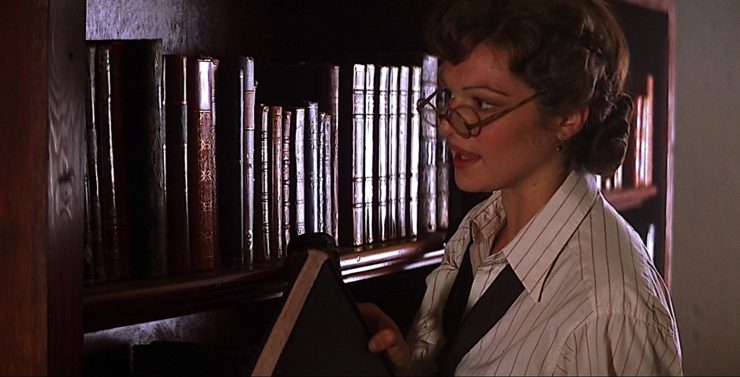
Evie is introduced in a library, as I mentioned, talking to her books as she shelves them. While some of the men around her doubt her intellect, the movie makes it clear that she’s ridiculously smart—but more than that she’s driven. This is her quest, not Rick’s or her brother’s. She’s not trying to work out any issues about her parents. She started studying Egyptology because of the stories around the Book of Amun-Ra, and now she’s getting to fulfill her life’s dream. She gleefully describes mummification to a visibly squeamish Rick, compares her own career favorably to her brother’s, and even when a brainwashed horde is beating the museum’s doors down, she can focus up, translate Ancient Egyptian, and still have enough pettiness left over to dis the Bembridge Scholars before she flees. And of course, in the most important moment in the movie, she drunkenly declares herself a librarian, tells O’Connell she’s going to kiss him, and then passes out on his lap—and when we see her the next morning she is not even slightly hungover: a true hero.
And speaking of heroic drinking: Jonathan. We meet him in a sarcophagus with his arm draped over a mummy’s shoulders. When Evie asks him has any respect for the dead, his reply is, “Of course I do! But sometimes, I’d rather like to join them.” Also, he is clearly very drunk. But when Evie tells him she’s been rejected by the Bembridge Scholars again (those fiends!) he’s immediately supportive, calls her “old mum”, and gives her what turns out to be the key to the book she’s searched for her entire life. And here the character turns again. He tells her he got the key at a dig in Thebes (which is a lie) but he also says, plaintively, “I never find anything. Evie, please tell me I’ve found something?”
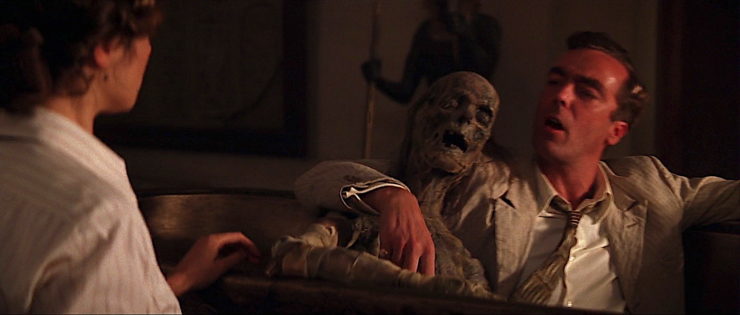
Now that’s just—that’s a lot to pack into the introduction of your ne’er-do-well comic relief character. He opens with suicidal ideation, and then drops a bunch of facades to reveal that he sees himself as a failure. But then he’s also revealed to be a thief a scene later, so was his pathos real? As a kid I immediately read him as queer (which I stand by, despite what later films would have me believe) but it wasn’t until more recently that I saw people online discussing an aspect of his personality that makes everything click into place: he has PTSD from World War I. He’s not just a drunken ne’er-do-well (“Not that there’s anything wrong with that,” they say hastily, eyeing their G&T) it’s that he grew up in a wealthy family of explorers and intellectuals, went off to War, had his brain rearranged by the horrors he found there, and is now a drunken pickpocket. Usually this type of character would have a set trajectories: either he sells out his sister and O’Connell for treasure, or he sells them out, then sacrifices himself to make up for it, or maybe he’s a coward who has to get knocked into shape by O’Connell’s character—a lighter version of Beni’s arc, basically. The smartass who gets punched in the mouth by the “alpha male” and has to learn to be a man.
But here again, the movie zigzags around all of those outcomes. When Rick recognizes him, he punches him through the bars of his cell. (And since he’s not involved in the negotiation for Rick’s life I assume Evie, just, left him there? In the dirt?) When the two meet again Jonathan pats Rick on the chest, and he’s the one who takes the Marion reference, calling Rick “partner.” Rick apologizes for punching him and Jonathan waves it off, saying it “happens all the time.” He also nudges Evie and says “Nothing to like there at all” whilst devouring Rick with his eyes. Over the rest of the film, Jonathan repeatedly charges into fights to protect Evie, and proves to be an excellent marksman (especially when drunk). Faced with the fifteen strong rival archaeology team, Rick says “I’ve has worse [odds]” and Jonathan pipes up with “Me too!” When Rick looks at him in disbelief Jonathan just raises his eyebrows at him and then turns back to the other guys, all the while keeping his gun trained on Beni.
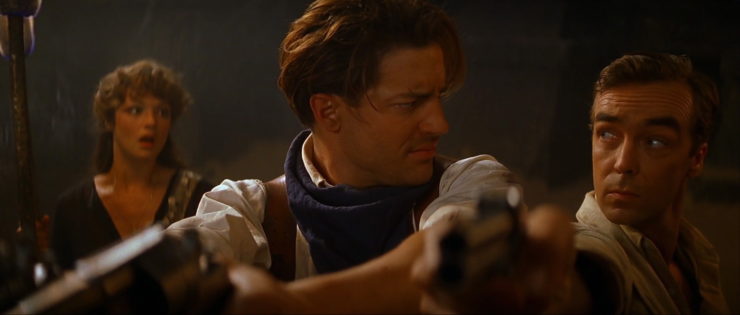
The movie further undercuts the trope of the rugged hero and the cowardly thief by creating a very interesting dynamic between Rick and Jonathan. Whenever Evie isn’t around Rick turns all of his protective instincts toward Jonathan, ushering him through passageways and checking to make sure he’s OK. For his part, Jonathan is even quicker to jump into fights. The movie feints back toward a stereotypical version of the character when Jonathan finds a jeweled scarab, in a callback to the warden’s death. But even here, Rick cuts the scarab out of his arm and saves him, but moments later, when Imhotep’s mummy priests swarm the men, Jonathan reaches into Rick’s chest holsters to un-sheath two of his guns, and starts shooting mummies down, to Rick’s obvious shock. Rick finally has to pull Jonathan away from the fight to save him, and Jonathan’s response is to throw one of the guns at the mummies as one last salvo before Rick pushes him into another room. Rather than Jonathan having to learn to be “tough” in the same way that Rick is, the movie leaves room for him to be a crack shot. His intelligence is not displayed like Evie’s, instead, like Rick, he displays it on the fly, by being creative under extreme pressure and intoning “Imhotep” to trick a mind-controlled horde. And through him it allows Rick space to be genuinely nurturing, as he accepts Jonathan for who he is.
The three characters all come together beautifully in the final battle. When Jonathan and Rick finally get to the chamber with the Golden Book, Rick frees Evie as fast as he can, and the two of them fight and/or run away to keep the mummies occupied while Jonathan reads from the book. When Jonathan gets stuck on the last symbol, Evie coaches him through it while fighting Anck-Su-Namun—never doubt the Carnahan siblings’ ability to focus on intricate translation work under extreme stress—and it’s their brains that get them out of trouble. Best of all, when Imhotep attacks Jonathan, Jonathan picks his pockets to get the key, which allows Evie to open the book of the dead and send Imhotep’s Ka back to the afterlife.
The final battle doesn’t turn into “Rick vs. The Mummy”, but rather “the three leads each use their skills to work together and defeat Imhotep.” It also gives Imhotep another moment of genuine sorrow when he loses Anck Su-Namun—while you’re not supposed to root for the Mummy, exactly, the movie never mocks his love or the horror of his death. (In fact, Rick, Evie, and Jonathan stand watching Imhotep’s death in much the same way that Rick, Jonathan, and Ardeth Bay stood and watched quicksand take Winston’s plane.)
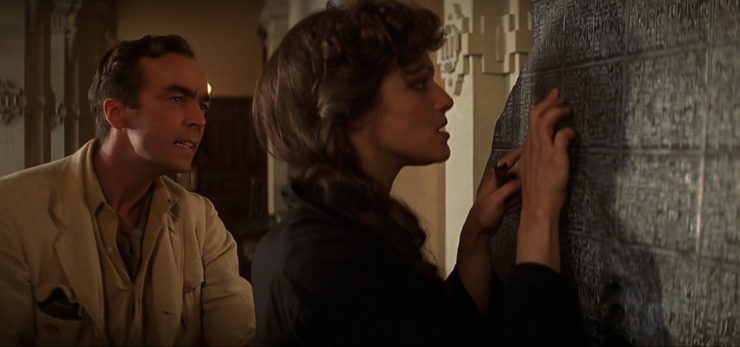
While Evie is attracted to Rick, she is never sexualized. The closest the movie comes to ogling her is when we see her in a traditional veiled outfit after the boat attack, and even that is simply a mirror of the moment when we were shown a post-prison, washed, and clean-shaven Rick O’Connell. The film acknowledges Rick and Evie’s feelings for each other, but they don’t even really kiss until after they’ve saved each other a couple times, and Evie never really falls into the typical movie trap of “besotted female character loses her all her intelligence points because she’s a love interest now.” She and Rick and Jonathan and Ardeth Bay save each other, multiple times. Even when Evie is taken by Imhotep, she’s not a damsel, she chooses to leave with him to save the others, and to give Rick time to plan. It’s her intelligence that saves them from Imhotep.
This leads us back to chaotic bi energy.
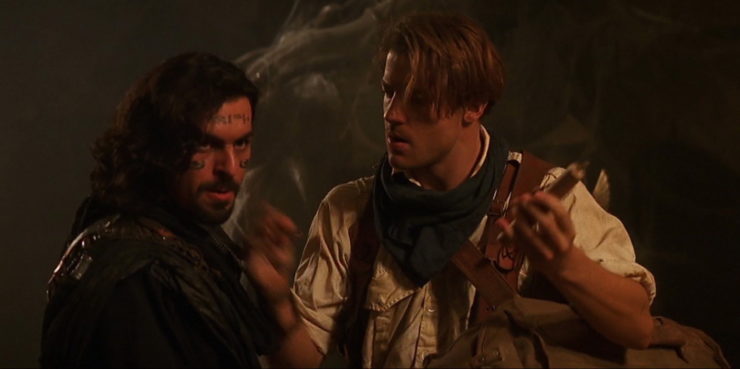
The obvious joke, which is accurate, is that everyone in this film is so uniquely and impossibly attractive that it’s an erotic minefield. But it goes much further than that. It’s more that the movie has a certain generosity of spirit that is inclusive in a really basic way. The Mummy doesn’t judge you. Ardeth Bay is a badass, he’s right about everything, the film treats him with respect, and Rick strikes a match on his impossibly hot stubbled jaw while making significant eye contact with him. Jonathan and Evie both gently ogle Rick, but Rick is allowed to be more than just a himbo—he’s smart and witty and caring. Jonathan isn’t punished for loving treasure, but it’s gently suggested that he needs to prioritize a little better. When he puts his sister’s safety first, the movie rewards him when we see that one of the camels, unbeknownst to Jonathan, is carrying a bag of gold and jewels that should be more than enough to fund the next adventure. Beni isn’t punished for being a spiritual ho—his knowledge of Hebrew is what briefly saves his life, and even after everything he’s done, Rick still tries to rescue the slimy bastard. It’s his greed that does him in, nothing else. Evie is never punished or humiliated for being a smart woman, or even for reading from the forbidden book—it’s her scholarship that saves the day in the end. She’s also not punished for being a skeptic—she rejects the idea of a curse early on by saying “If I can see it and touch it, then it’s real. That’s what I believe” and, true to her word, once she can see and touch Imhotep she concludes that the stories about Hamunaptra were correct.
Which leaves us one final, perfect subversion. Do our attractive leads get a passionate end-of-film kiss? They do! But then Rick O’Connell, Soft Boi Legionnaire, ends that kiss with a nose boop as his partner laughs in delight.
Leah Schnelbach could write n addition 3,000 words on why Beni is one of the best characters in film. Maybe next week? Come diss the Bembridge Scholars with them on Twitter!










